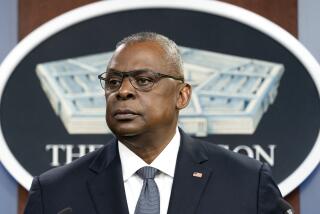Administration Begins Review of Trade Policy : Cabinet-Level Study Will Determine Future U.S. Relations With Japan, Unified Market in Europe
WASHINGTON â The Bush Administration has begun a full-scale review of U.S. foreign trade policy, designed to take stock of the Reagan years and to hammer out a consensus on where the government ought to go from here.
The Cabinet-level study, expected to be completed in mid- or late May, involves about a half-dozen major segments, including a special review of U.S. trade relations with Japan and a move to consolidate U.S. strategy on the plan for a unified market in Europe by 1992.
Senior Administration officials caution that it is too early to tell where the stock-taking will lead. Similar reviews of U.S. foreign policy and attitudes on trade with the Soviet Union recently concluded that current policy is on track and should not be changed.
Nevertheless, policy-makers say the Administration is considering âeverythingâ--from changing the United Statesâ own broad economic policies to help reduce the trade imbalance, to creating new economic alliances in Asia to strengthen U.S. influence there.
The effort, launched a month ago, has remained low key so far and still is at the staff-level stage. Strategists say there now are so many new faces in top policy-making slots that there is âa wide diversity of viewsâ that still must be sorted out.
Still, the probability is that the group will at least come up with some new proposals, one insider said. âThis Administration wants to put its own stamp on things,â he added, âbut itâs more likely to be a confirmation of previous policy and not a radical departure.â
For example, in the area of trade relations with Japan, the panel is likely to look at remaining trade impediments that may be preventing U.S. firms from penetrating the Japanese market--such as the Japanese pricing and distribution systems and the structure of Japanese firms.
The study, ordered by the Cabinet-level Economic Policy Council, is being coordinated by newly appointed U.S. Trade Representative Carla A. Hills. Each of the major subtopics has been assigned to a separate interagency task force for review.
Among the major issues the review will encompass are how to handle the final year of negotiations in the 96-country Uruguay Round of global trade-liberalization talks, what to do about trade practices of other countries and what new trade initiatives President Bush should propose.
The effort comes at a critical time for U.S. trade policy. The nationâs trade deficit, which narrowed sharply last year, has begun to level off and may even widen again in 1990, some experts say. And the nation is facing new competitive challenges from abroad.
At the same time, governments of the major industrial countries have exhausted many of the remedies they once prescribed for paring back their trade imbalances: The value of the dollar has fallen, and West Germany and Japan have spurred more growth at home.
Although the staff sessions so far have been confined to reviewing current policies, Administration strategists say there is likely to be a lively debate when the discussion reaches the Cabinet level.
Both Hills and Commerce Secretary Robert A. Mosbacher have indicated that they want to pursue a more aggressive policy on trade with Japan--a shift that could be accelerated even further by the 1988 Trade Act, which requires the Administration to take tougher stands on some issues.
At the same time, senior officials say Richard G. Darman, director of the Office of Management and Budget and a former deputy secretary of the Treasury, wants the United States to take new steps to employ more regional economic ties to help increase its economic leverage around the world.
For example, the Treasury at one time considered proposing the creation of a new economic organization for Pacific Rim countries similar to the Paris-based Organization for Economic Cooperation and Development, which serves as a forum for industrial countries.
And some officials also want to improve coordination of trade and economic issues within the Administration--such as having lower-level officials back up broad policy goals in everyday dealings with their counterparts from foreign countries.
Senior officials in several of the departments and agencies involved stressed that whatever changes evolved, it seems unlikely that the Administration will move toward so-called managed trade--the creation of cartels that divide up key markets among several countries.
Nor would it seek to establish regional trading blocs that effectively shut out would-be trading partners from other parts of the world, these officials said. Even an arrangement such as the just-completed U.S.-Canadian free-trade zone has only limited application, they said.
Nevertheless, the Administration seems likely to consider more modest trade treaties and agreements to improve two-way trade and investment with Mexico and other countries.
And it will seek to strengthen negotiations under the Uruguay Round, which has just entered its final phase.
More to Read
Get the L.A. Times Politics newsletter
Deeply reported insights into legislation, politics and policy from Sacramento, Washington and beyond. In your inbox three times per week.
You may occasionally receive promotional content from the Los Angeles Times.










